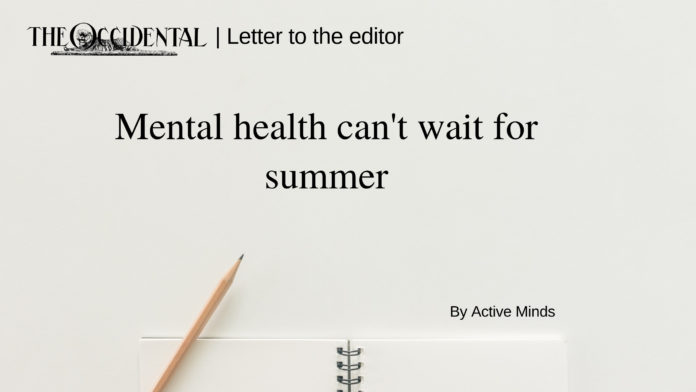I often hear people say, “It will be better when the semester ends,” “I’ll sleep when it is summer” and “I’ll figure out my mental health when college is over.” There are two major problems with these all-too-common phrases. The first issue is that mental health cannot and should not be an afterthought. The second is that summer vacation does not always make it easier to take care of one’s mental health.
Mental health is similar to physical health –– avoiding the problem rarely helps. If someone breaks their ankle and continues to not go to the doctor until they “have enough time” to go to the doctor, the ankle is going to get worse and worse each day. In the same way, every day a person ignores their mental health concerns, they get worse. Thus, if you are one of the many people ignoring their mental health with finals approaching — stop. Pushing down anxiety or sadness simply because you have homework to do is hurting you. It allows the momentary anxiety, that could be eased by self-care, to fester and grow into something more. In fact, neglecting to address minor mental health concerns can sometimes lead to chronic mental illnesses. For mental illnesses like depression and anxiety, the symptoms worsen the more we ignore them.
Summer is not always easy when it comes to mental health, even with no classes. In fact, many people experience worsened mental health over the summer. Friendship and family dynamics sometimes shift while you’re away, which can increase stress when you go back home. Mental health is also sensitive to new jobs and internships, as those involve a whole bunch of new experiences which can trigger a lot of intense emotions. More surprisingly, those who travel for the summer or get much-needed rest often feel guilty about not doing more work. Although that guilt is not justified, it can still have a negative effect on mental health.
There are a lot of ways mental health over the summer is hard; nonetheless, there are also a lot of ways to take extra care of your mental health over the summer. First, practice self-care. Take long hot baths, spend time with people, watch Netflix, or read a good book; in short, do something that brings you joy every day. Yes, every single day. Second, record your feelings. Whether that be through journaling, drawing, praying or just thinking, observing what you are feeling really helps with mental health. Third, if eating enough or sleeping enough is something you struggle with at college, use the summer to be very strict with yourself about getting 8 hours of sleep and eating all the food groups throughout the day. Finally, keep your eyes on your own life. Most of us over the summer will be a little less surrounded by peers than we are in the school year. Therefore, the summer is a good time to work on not comparing your life to others. We all can handle different amounts of stress and sorrow, and part of mental health is knowing your limits and not forcing them to be the same as those around you.
Summer will not miraculously make your mental health perfect, and mental health should not be put off for any reason. Some people may even have to work harder to maintain their mental health over the vacation. Nevertheless, if you, like many, find it hard to start practicing self-care during the school year, summer can be a good time to start. Once you start, it’s a lot easier to continue.
Authors for this piece are Adelia Nunn and the Active Minds E-board, a chapter of the organization at Occidental College. Active Minds is a national organization that aims to reduce the stigma surrounding illness and promote good mental health.
![]()




































